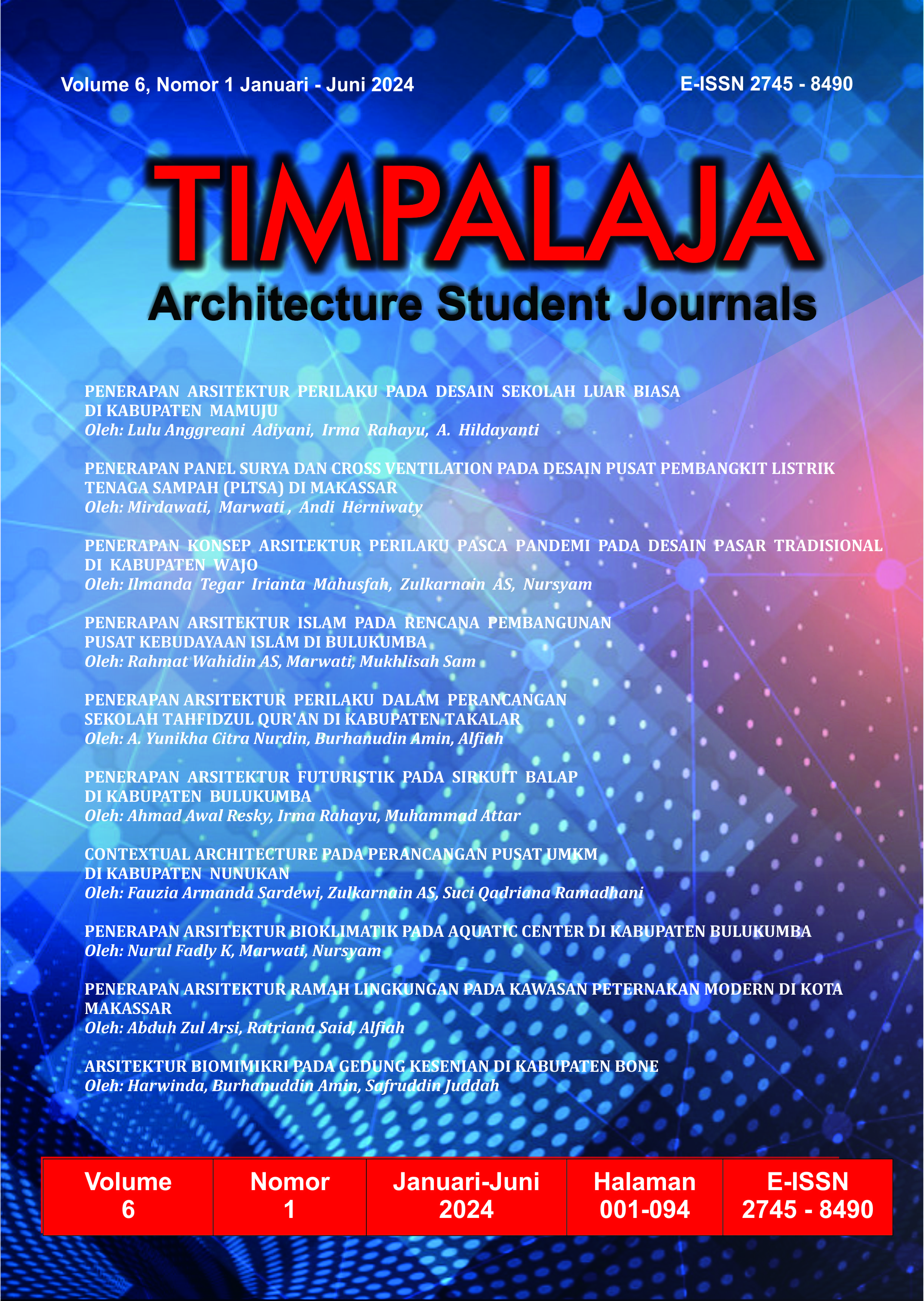Arsitektur Biomimikri pada Gedung Kesenian di Kabupaten Bone
Abstract
_ Art is an inherent part of humanity; where there are people, art exists. An Arts Building is a venue that showcases various art forms and serves as a source of information, knowledge, education, and recreation in Bone Regency. As development increases, so does pollution. Therefore, it is essential to design buildings that can mitigate or minimize this pollution while functioning effectively, such as by creating environmentally friendly buildings. This research was conducted descriptively through a literature review, collecting information and data from books and the internet relevant to the research topic. The results show that designing an Arts Building with a biomimicry architectural approach using natural strategies is a suitable solution. One application of the biomimicry concept is the use of self-cleaning materials. The addition of TiO2 (Titanium Dioxide) to building materials aims to decompose harmful elements in the surrounding environment through a photocatalysis process similar to that in plants.
References
Benyus, J. M. (1997). Biomimicry: Innovation Inspired by Nature. New York, NY: HarperCollins.
Bone.go.id. (2013, April 26). Geografi dan Iklim. Retrieved from https://bone.go.id/2013/04/26/geografi-dan-iklim/.
Brata, I. B. P. H. S. (2010). Tinjauan Gedung Pertunjukan Kesenian. In Proceedings of the Seminar Nasional Seni Pertunjukan (pp. 18–43). Denpasar, Indonesia: Institut Seni Indonesia Denpasar.
Setiawan, E. (2021). Gedung. In KBBI. Retrieved from https://kbbi.kemdikbud.go.id/entri/gedung.
Fujishima, A., Rao, T. N., & Tryk, D. A. (1999). TiO2 Photocatalysis Fundamentals and Applications. Tokyo, Japan: BKC Inc.
Google. (2021). Asal Usul dan Sejarah Tari Pajoge. Retrieved from https://seringjalan.com/asal-usul-dan-sejarah-tari-pajoge/.
Helms, M., Vattam, S. S., & Goel, A. K. (2009). Biologically Inspired Design: Process and Products. Design Studies, 30(5), 606–622. https://doi.org/10.1016/j.destud.2009.04.003
Irhandayaningsih, A. (2018). Pelestarian Kesenian Tradisional Sebagai Upaya Dalam Menumbuhkan Kecintaan Budaya Lokal Di Masyarakat Jurang Blimbing Tembalang. Anuva, 2(1), 19. Retrieved from https://journal.unnes.ac.id/sju/index.php/anuva/article/view/17246
Puspatarini, R. A. (2019). Implementasi Pendekatan Arsitektur Biomimikri Melalui Penggunaan Self-Cleaning Centre Dan Oceanarium. In Proceedings of the International Conference on Biomimicry in Architectural Design (pp. 280–285). Surabaya, Indonesia: Institut Teknologi Sepuluh Nopember.
Rahman, H. (2020, January 15). Dewan Kesenian Bone. Retrieved from https://topikterkini.com/2020/01/15/dewan-kesenian-bone/.
Zari, M. P. (2018). Regenerative Urban Design and Ecosystem Biomimicry. Abingdon, UK: Routledge.
Copyright (c) 2024 Harwinda, Burhanuddin Amin, Safruddin Juddah

This work is licensed under a Creative Commons Attribution-ShareAlike 4.0 International License.
By submitting your manuscript to our journal, you are following Copyright and License







